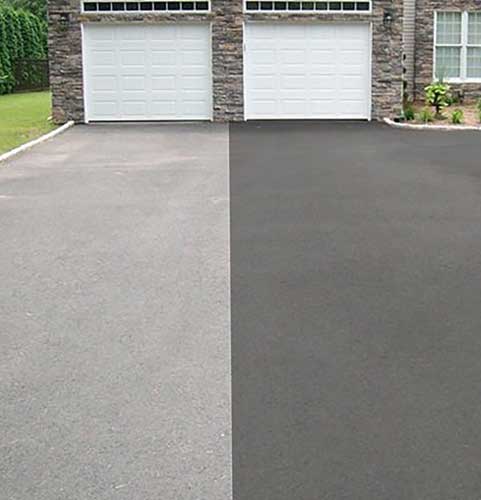Seal in Top Quality: Professional Solutions for Asphalt Repair and Sealing
Cold Mix Asphalt Vs. Hot Mix Asphalt: Which Is Right for You?

Make-up Distinctions
Cold mix asphalt is generated by emulsifying the asphalt binder with water and an emulsifying representative prior to blending it with aggregate. The hot mix asphalt manufacturing procedure includes heating up the accumulation and asphalt binder separately before incorporating them at the asphalt plant.
Additionally, cool mix asphalt tends to be much less thick and a lot more versatile than hot mix asphalt. This adaptability makes it better fit for areas with greater degrees of movement, such as driveways or roads with hefty website traffic. On the other hand, hot mix asphalt is recognized for its high durability and resistance to rutting and splitting, making it a preferred choice for freeways and high-traffic roadways where durability is crucial.
Setup Refine Variations
The process of setting up chilly mix and hot mix asphalt shows remarkable variances in their needs and procedures. In contrast, warm mix asphalt requires a more elaborate installment procedure. Due to the heating needs, warm mix asphalt installations are normally carried out by professionals with specialized equipment, ensuring a more structurally audio and irreversible result.
Toughness and Durability Variables
When taking into consideration asphalt choices, resilience and long life are important elements to evaluate for lasting pavement efficiency. Warm mix asphalt (HMA) is recognized for its phenomenal toughness and longevity.
In terms of long life, HMA commonly exceeds CMA as a result of its remarkable toughness and resistance properties. HMA sidewalks have a longer life span, requiring much less constant repair services and maintenance, which can translate to cost financial savings in the future. Furthermore, HMA sidewalks are much more quickly adjustable to meet details job demands, better boosting their durability.
Expense Considerations
Thinking about the monetary effects is a vital element when reviewing the option in between warm mix asphalt (HMA) and chilly mix asphalt (CMA) for pavement projects. While the preliminary price of hot mix asphalt is generally greater than that of chilly mix asphalt, HMA typically supplies an extra affordable option over time because of its superior durability and longevity. HMA is known for its ability to hold up against heavy web traffic tons and severe climate problems, decreasing the requirement for regular fixings and upkeep. On the various other hand, chilly mix asphalt is a lot more economical in advance yet might require even more her response constant patching and resurfacing, leading to greater upkeep costs with time.
In enhancement to material costs, it's vital to think about the expenditures related to setup and upkeep when contrasting HMA and CMA. HMA usually needs specific devices and skilled labor for correct setup, which can affect overall project expenses. Alternatively, CMA is easier to deal with and can usually be applied utilizing less complex methods, potentially lowering installment expenses. Ultimately, the decision between HMA and CMA ought to consider not just the first expense but additionally the lasting economic ramifications to figure out website here one of the most economical choice for the certain pavement project.
Environmental Effect Comparison
Comparison of the ecological effects between hot mix asphalt (HMA) and cool mix asphalt (CMA) exposes distinct differences in sustainability techniques. HMA manufacturing calls for high temperature levels, leading to increased power usage and greenhouse gas discharges.
Moreover, making use of CMA commonly involves reusing existing asphalt sidewalk, advertising source preservation and reducing the quantity of waste sent out to landfills. This reusing facet better boosts the sustainability of CMA contrasted to HMA. In general, when considering the environmental impact, CMA becomes a much more ecologically lasting choice because of its lower power requirements, decreased emissions, and the possibility for recycling existing products. By opting for CMA over HMA, roadway building and construction jobs can add positively to environmental preservation initiatives.
Verdict
Finally, the choice between cool mix asphalt (CMA) and hot mix asphalt (HMA) depends upon various aspects such as composition, setup procedure, sturdiness, longevity, expense, and ecological impact. asphalt patch repair. While CMA offers a fast and cost-effective remedy for small repair services, HMA ensures exceptional toughness and longevity for rush hour areas. Think about these variables carefully to establish which type of asphalt is the ideal selection for your paving requires

Thinking about the economic implications is a crucial element when reviewing the choice in between warm mix asphalt (HMA) and cold mix asphalt (CMA) for sidewalk tasks. While the first cost of hot mix asphalt is typically higher than that of cool mix asphalt, HMA often provides a much more cost-effective service in the lengthy run due to its premium resilience and durability. asphalt repair.Comparison of the environmental effects in between hot mix asphalt (HMA) and cool mix asphalt (CMA) reveals distinct differences helpful hints in sustainability methods.In verdict, the option in between cool mix asphalt (CMA) and warm mix asphalt (HMA) depends on numerous factors such as composition, installment procedure, durability, longevity, cost, and environmental effect